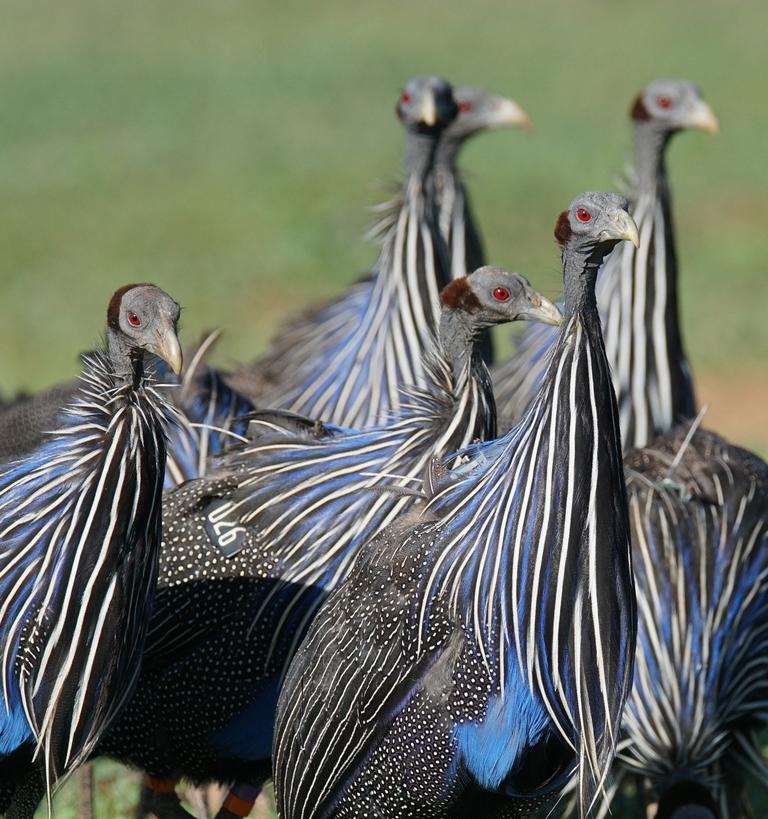Vulturine Guineafowl Project

Vulturine Guineafowl Project
Institutions:
Max Planck Institute of Animal Behaviour (Germany)
University of Zurich (Switzerland)
Australian National University (Australia)
National Museums of Kenya (Kenya)
Primary Investigators:
Damien Farine, dfarine@ab.mpg.de
Charlotte Christensen, charlotte.chirstensen@uzh.ch
Project Manager: Sikenykeny Kipkorir
Vulturine guineafowl (Acryllium vulturinum) are the largest species of guineafowl and are highly social, exhibiting distinct decision-making structures. This project seeks to better understand their social structure and decision-making — but how does one answer questions of the collective movement, social dynamics, and fitness consequences of these social decision-making vulturine guineafowl? By incorporating state-of-the-art technology and computational techniques with lifetime monitoring of individuals!
In 2016, the social lives of these brilliantly blue birds became the focus of the Vulturine Guineafowl Project. In the first three years, the project team has trapped and marked a whopping 900 individual birds, and fit solar-powered GPS tags to individuals in every social group in the study area. Combining the detailed information about the home range and movement of each group, together with daily censuses of group membership and affiliative interactions, provides the basis for mechanistic studies that shed light on processes ranging from the energetics of movements to the consequences of harsh droughts, and how these processes are altered by living in differently sized groups.
The team hopes that these unique long-term, large-scale, and high-resolution data will provide the critical pieces for answering key questions about the evolution of animal societies and how species will adapt to novel environmental conditions.
Publications:
Papageorgiou, D., Christensen, C., Gall, G.E.C., Klarevas-Irby, J., Nyaguthii, B., Couzin, I.D., Farine, D.R. (2019) The multilevel society of a small-brained bird. Current Biology 29(24): R1120-R1121.
Papageorgiou, D., Farine, D.R. (2020) Shared decision-making allows subordinates to lead when dominants monopolise resources. Science Advances 6(48): eaba5881.
Klarevas-Irby, J.A., Wikelski, M., Farine, D.R. (2021) Efficient movement strategies mitigate the energetic cost of dispersal. Ecology Letters 27(7): 1432-1442.
Dehnen, T., Papageorgiou, D., Nyaguthii, B., Cherono, W., Penndorf, J., Boogert, N.J., Farine, D.R. (2022) Costs dictate strategic investment in dominance interactions. Philosophical Transactions of the Royal Society B 377: 20200447.
Papageorgiou, D., Nyaguthii, B., Farine, D.R. (2024) Compromise or choose: shared movement decisions in wild vulturine guineafowl. Communications Biology 7, 95.
Papageorgiou, D., Cherono, W., Gall, G., Nyaguthii, B., Farine, D.R. (2024) Testing the information centre hypothesis in a multilevel society. Journal of Animal Ecology 93(8): 1147-1159.
Nyaguthii, B., Dehnen, T., Klarevas-Irby, J.A., Papageorgiou, D., Kogsey, J., Farine, D.R. (2025) Cooperative breeding in a plural breeder, the vulturine guineafowl. Ibis 167(3): 695-710.
Klarevas-Irby, J.A., Nyaguthii, B., Farine, D.R. (2025) Moving as a group imposes constraints on the energetic efficiency of movement. Proceedings of the Royal Society B 292: 20242760.
Brandl, H.B., Klarevas-Irby, J.A., Zuñega, D., Hansen Wheat, C., Christensen, C., Omengo, F., Nzomo, C., Cherono, W., Nyaguthii, B., Farine, D.R. (2025) The physiological cost of leadership in collective movements. Current Biology 35(16): 4003-4010.
